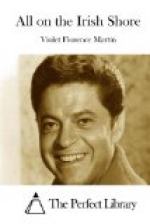As I reached the Delhi walls I took one look at the clock. There was barely a minute left.
“By Jove!” I gasped, “I’m done!”
I shouted and yelled to the pony like a madman, to keep up what heart was left in the wretched little brute, holding on to him for bare life, with my arms and legs straight out in front of me. The gray wall and the blinding road rushed by me like a river—I scarcely knew what happened—I couldn’t think of anything but the ticking of the clock that I was somehow trying to count, till there came the bang of a pistol over my head.
It was the Cashmere gate, and I had thirteen seconds in hand.
* * * * *
There was never anything more heard of the bagman. He can, if he likes, soothe his conscience with the reflection that he was worth a thousand pounds to me.
But Mrs. Le Bretton never quite forgave me.
AN IRISH PROBLEM
Conversation raged on the long flanks of the mail-car.
An elderly priest, with a warm complexion and a controversial under-lip, was expounding his native country to a fellow-traveller, with slight but irrepressible pulpit gestures of the hand. The fellow traveller, albeit lavender-hued from an autumn east wind, was obediently observing the anaemic patches of oats and barley, pale and thin, like the hair of a starving baby, and the huge slants of brown heather and turf bog, and was interjecting “Just so!” at decent intervals. Now and then, as the two tall brown mares slackened for a bout of collar-work at a hill, or squeezed slowly past a cart stacked high with sods of turf, we, sitting in silence, Irish wolves in the clothing of English tourists, could hear across the intervening pile of luggage and bicycles such a storm of conversation as bursts forth at a dinner-party after the champagne has twice gone round.
The brunt of the talk was borne by the old lady in the centre. Her broad back, chequered with red plaid, remained monumental in height and stillness, but there was that in the tremor of the steel spray in her bonnet that told of a high pressure of narrative. The bearded Dublin tourist on her left was but little behind her in the ardour of giving information. His wife, a beautifully dressed lady with cotton-wool in her ears, remained abstracted, whether from toothache, or exclusiveness, or mere wifely boredom, we cannot say. Among the swift shuttles of Irish speech the ponderous questions and pronouncements of an English fisherman drove their way. The talk was, we gathered, of sport and game laws and their administration.
“Is it hares?” cried the Dublin tourist, perorating after a flight or two into the subject of poachers; “what d’ye think would happen a hare in Donegal?”
His handsome brown eye swept his audience, even, through the spokes of a bicycle, gathering in our sympathies. It left no doubts as to the tragedy that awaited the hare.




